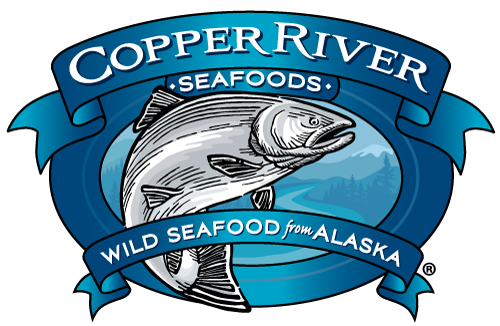Posted by Martin Weiser on 29th May 2018
Walmart deal makes for year-round processing jobs in Anchorage
By:Naomi Klouda
Copper River Seafoods highlighted its emerging role as a mainstay in the Alaska economy in a short ceremony Jan. 8 that celebrated selling 250,000 pounds of fish per year to Walmart and Sam’s Club.
Even in winter, the plant on the shores of Ship Creek is filled with 100 employees cutting frozen fillets into portions that go out the door destined for plates in Alaska and the Lower 48.
About 30,000 to 40,000 pounds of sockeye and kita, or chum salmon, per week continue to be processed throughout the winter, according Copper River Seafoods CEO Scott Blake.
Plants like Copper River Seafoods in Anchorage are maximizing seafood jobs in the state’s economy and the blue ocean economy framework, said Alyssa Rodrigues, economic development manager at the Alaska Department of Commerce, Community and Economic Development.
“Copper River is able to sustain 100 year-round jobs when most of our seafood jobs aren’t year-round,” Rodrigues said at the event, which included brief comments by Anchorage Mayor Ethan Berkowitz, Blake and Walmart officials.
What’s different from traditional seafood marketing is this mainstay of jobs are created from value-added frozen fillets. Filets cut into portions go into a “Members Mark” packaging that indicates the partnership between Copper River Seafoods and Walmart.
“Typically seafood is minimally processed. Value-added bolsters the ocean economy, getting more value out of Alaska’s ocean resources,” Rodrigues said. Gaining more value-added Alaska production is on the department’s top 10 strategic goals.
Berkowitz called Walmart “an Alaska-sized company” that helps stimulate the economy and “deserves our recognition.”
Walmart has said its Alaska deal with the seafood company is part of its 10-year commitment through 2023 to buy an additional $250 billion in products to support American jobs, said Walmart’s Kevin Loscotoff.
In 2013, Alaska fishermen picketed the South Anchorage Walmart because of a sustainability certification dispute when the state ended efforts to keep the Marine Stewardship Council label. Walmart required a third-party sustainability certification for its seafood and was not going to keep stocking Alaska salmon as a result.
The fracas, joined by then-Sen. Mark Begich and Sen. Lisa Murkowski, resulted in a deeper commitment from Walmart to purchase Alaska’s wild salmon for its customers and the Alaska Seafood Marketing Institute has since developed its own sustainability certification process.
Walmart announced its intention to put its buying power into products manufactured, assembled and sourced in America, said spokesman Scott Markley.
“We’re half way through that commitment,” Markley said.
Walmart has since purchased $800 million directly from Alaska suppliers, “and Copper River was part of that. We’re buying more with our existing domestic suppliers, which creates more jobs that helps our stores and local communities. And we can move quicker on trends.”
The Copper River Seafoods plants in Cordova, Kenai, Naknek and Anchorage employ more than 900 people seasonally, a hiring task shared with the Alaska Department of Labor’s Job Center. The center recruits workers and provides orientation, said Nelson San Juan, one of the recruiters.
Fishing families in Cordova were struggling in 1998 when Blake said they entertained top Walmart officials on a visit to Cordova. Copper River Seafoods at its conception consisted of four fishermen and one employee, Blake told the gathering.
But Walmart wanted Copper River Seafoods and Blake wanted to net a partnership with the giant retailer. Through the years, their partnership grew, enabling the seafood company to grow to its current size.
“Thanks to Walmart and Sam’s Club, and their belief we could do it, we now process and ship 250,000 pounds a year,” he said.
Wild caught salmon supplied by Copper River has been on WalMart and Sam’s Club shelves in some form since 2007. The company also sells to Costco, restaurants in Alaska and the Lower 48 and other retailers.
“Twenty-two years later, we’re close to employing 200 people year-round and we’ve become a significant employer for 1,000 fishing families,” Blake said.
The seafood wholesaler also obtained Homeland Security clearance for its facility, which means the Anchorage plant is subject to shipping scrutiny ahead of time.
“Our products ride in the belly of commercial airlines and rather than having them opening and searching our boxes, we would rather screen them ourselves,” said manager Billy Green during a tour of the 50,000-square foot facilities. “That way no one bothers with it.”
After more than four years of routine and impromptu inspections, “we haven’t had a single failure,” he said.

